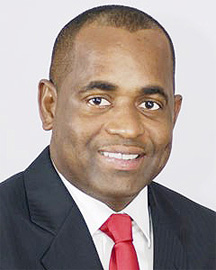BRIDGETOWN, Barbados, CMC – Dominica Prime Minister Roosevelt Skerrit says there is a role for regional governments in the management of West Indies cricket but says key questions about ownership of the regional game needed to be answered.
In a telephone interview with CMC Sports, Skerrit contended that cricket was too crucial to Caribbean life and development, for governments to be excluded.
“It is unfortunate that people believe that in order to democratise something you have to get politicians out of the system,” Skerrit said.
“We are the ones who build infrastructure on the behalf of tax paying citizens. Take Dominica for example, the stadium (Windsor Park) is owned by the people of Dominica, the taxpayers and we are their legal representatives.
“There is no reason why one should believe you should leave out politicians in cricket or any sport for that matter. There are ways and means in which government can assist in the management and development of players.

“While I respect the principles of the ICC (cricket’s world governing body), at the end of the day how do you leave out government in a very important aspect of the country’s development and in this case, the region.”
He was speaking against the backdrop of estranged opener Chris Gayle’s call for CARICOM’s intervention in his impasse with the West Indies Cricket Board.
The talismanic Jamaican was repeatedly overlooked for selection for the just concluded series against India, and a stormy meeting in Jamaica last month between Gayle and the WICB failed to broker a solution.
Guyana’s President Bharrat Jagdeo backed Gayle’s call for CARICOM intervention in the matter, with the Community subsequently deciding at the Summit last week in St Kitts, to reactivate the sub-committee on cricket to deal with the affair.
Skerrit, who last week witnessed Dominica’s first ever hosting of a Test at Windsor Park, said the issue of the ownership of West Indies cricket needed to be seriously addressed.
“The fundamental question which I think the Caribbean people and the Heads of Government will have to assist them in answering is who owns West Indies cricket,” he asserted.
“This has always been a very important question that hasn’t been really answered with any definitive response.
“When the players are at odds with the West Indies Cricket Board and the Heads are asked to intervene, then the WICB says ‘look this is our business this has nothing to with any government or any politician.’
“When the West Indies Cricket Board has issues with the players and they ask us to intervene, then the players tell the Heads it’s none of their business that this is a matter between an employee and employer.”
Skerrit said while regional governments had already invested significantly in terms of stadia, there was room for their role to be expanded further.
He said he also saw regional governments playing their part in mediating in the current turbulent relationship between the WICB and WIPA, with the aim of returning West Indies cricket to its halcyon days.
“We believe that cricket goes beyond the West Indies Cricket Board and the West Indies Players Association and it is in the interest of every Caribbean citizen to see there being a harmonious relationship between the two,” Skerrit noted.
“We believe the Heads of Government need to give greater focus to the issues of the development of cricket. Obviously we put in the infrastructure but in terms of the management and the development of players I think we would want to certainly assist the West Indies Cricket Board and WIPA to see what we can broker in engendering a better relationship between the two.
“At the end of the day, the people who are suffering are the West Indians, our pride, the very strong cricketing history, the successes of the 70s and the 80s. We all are reminiscent on those triumphs and we would like to see the present generation of cricketers bring back that type of pride to all of us.
“We as heads of government have a role to play in helping to bring back those types of memories and experiences to the present generation of West Indians.”





